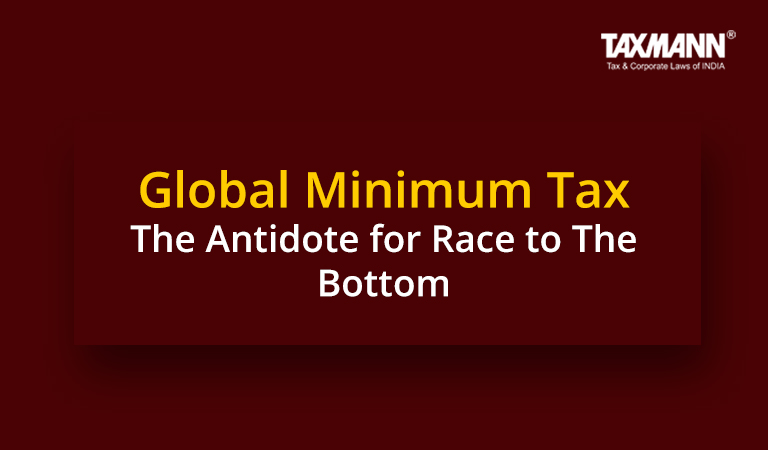Global Minimum Tax – The Antidote for Race to The Bottom
- Blog|News|International Tax|
- 2 Min Read
- By Taxmann
- |
- Last Updated on 21 October, 2021

Sunil Arora & Ameet Baid – [2021] 131 taxmann.com 182 (Article)
The G20/OECD in the recent years have made efforts to discourage MNCs and technology giants from shifting profits and tax revenues to low or no tax jurisdictions regardless of where the sales are made, or physical presence is based. Multinationals with income from intangibles such as royalties from trademark, patent, and software licenses have located or relocated such rights in lower tax jurisdictions to avoid paying higher taxes imposed by their home countries and by the countries where their income is earned.
With a view to preventing base tax erosion, the world leaders have moved to broadly agree on a Global Minimum Tax (GMT) in 2021, based on the “Pillar Two” proposal from the G20/OECD1 Inclusive Framework on BEPS. The objective has been to curtail the fostering of 30-year old tax competition of ‘Racing to the Bottom’ (an expression by the US Treasury Secretary) for attracting investments, by flooring the effective tax rates applied to cross-border investment by large MNCs.
In achieving the aforesaid objectives, most countries (including India) have been pushing for an overhaul of cross-border taxation of MNCs and have expressed harmony for a GMT at 15%. Out of 140 member countries in G20/OECD Inclusive Framework on BEPS, 136 countries have joined and agreed to the landmark deal on GMT to keep MNCs away from dodging taxes. While an agreement on GMT has been reached, time-to time consultations between G20/OECD member jurisdictions will be undertaken to settle the key technical aspects, rules, and specific element.
Click Here To Read The Full Article
Disclaimer: The content/information published on the website is only for general information of the user and shall not be construed as legal advice. While the Taxmann has exercised reasonable efforts to ensure the veracity of information/content published, Taxmann shall be under no liability in any manner whatsoever for incorrect information, if any.

Taxmann Publications has a dedicated in-house Research & Editorial Team. This team consists of a team of Chartered Accountants, Company Secretaries, and Lawyers. This team works under the guidance and supervision of editor-in-chief Mr Rakesh Bhargava.
The Research and Editorial Team is responsible for developing reliable and accurate content for the readers. The team follows the six-sigma approach to achieve the benchmark of zero error in its publications and research platforms. The team ensures that the following publication guidelines are thoroughly followed while developing the content:
- The statutory material is obtained only from the authorized and reliable sources
- All the latest developments in the judicial and legislative fields are covered
- Prepare the analytical write-ups on current, controversial, and important issues to help the readers to understand the concept and its implications
- Every content published by Taxmann is complete, accurate and lucid
- All evidence-based statements are supported with proper reference to Section, Circular No., Notification No. or citations
- The golden rules of grammar, style and consistency are thoroughly followed
- Font and size that’s easy to read and remain consistent across all imprint and digital publications are applied



 CA | CS | CMA
CA | CS | CMA
